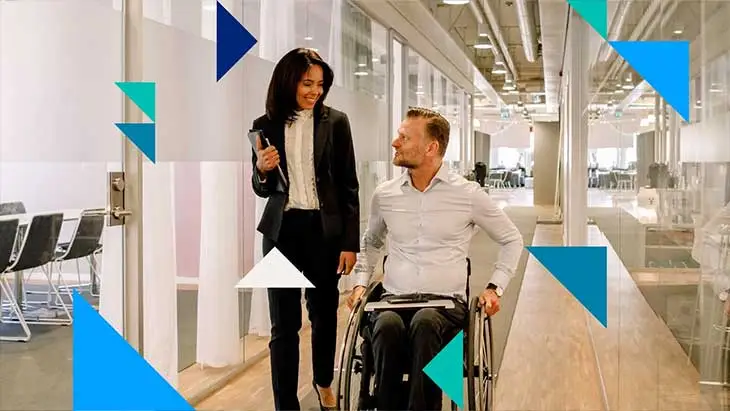Para Athletes can thrive in the world of work – with the right support
6 min read | Maureen Lynch | Article | Corporate social responsibility | DE&I

Para Athletes can thrive in the world of work – with the right support
After hanging up their spikes, what’s next for a professional athlete? Some may find themselves working in fields related to their sport, whether that be commentating or coaching, yet many struggle to break into the wider world of work. Reinventing yourself in a business context can be a complex challenge for any sporting professional, but perhaps more so for Para Athletes.
In partnership with Paralympics Ireland, we surveyed a cohort of Irish Paralympians to find out the challenges of balancing athletic duties with wider career prospects, and why Para Athletes can be a great asset for workplaces:
Being a Para Athlete is a balancing act
Time truly may be a professional athlete’s greatest opponent – both in and out of the sporting arena – with nearly half (45%) citing time management as being the biggest challenge when balancing sporting duties with work or studies, meaning part time roles are usually the most attractive.
The majority of those surveyed (35%) say they commit a minimum of 15 to 20 hours a week to their sport, with 28% spending over 20 hours. And with almost half of the respondents (48%) stating they combine full-time employment with being an athlete, it’s easy to see why professional development can take a backseat. In fact, almost a third (31%) have had to put their professional development on hold due to being unable to balance a full-time job and sporting career.
With the dedication and focus required to compete professionally, it’s unsurprising why many athletes are not fully prepared for life after competing. Less than a third (31%) of respondents said that they had planned for retirement from professional athletics, with a similar figure (34%) missing out on a job opportunity due to sporting commitments.
Para Athletes are well-educated with desirable attributes
Even with their time constraints and personal sacrifices, most of those surveyed were educated to a higher level, with 31% having an Honours Bachelors degree, 24% possessing a Masters degree, and 14% holding a Doctorate. However, it may be the hard-earned skills and attributes developed through their athletics careers that should interest employers the most.
Over three quarters (76%) said that communication and goal setting were their most transferable skills. This was followed by 69% who felt that their ability to take feedback onboard was their most valuable skill, while 66% thought that their employers would value their independence the most highly. Additionally, 62% indicated that their teamworking skills would help in the professional world, and just over half (52%) thought their leadership abilities were their greatest asset.
It’s easy to see how these skills could be cultivated in the world of high-performance sport. Through their unique experiences and demanding routines, Para Athletes possess a potent combination of interpersonal skills, self-reflection, and mental resilience, making them a talent network employers won’t want to miss out on.
Employers largely value Para Athletes
Despite the dedication and rigour that goes into professional athletics – and the acquired skills mentioned above – the sport can sometimes be seen as a ‘hobby’ rather than a full-time commitment. This viewpoint may be compounded in the case of Paralympians, who too often do not receive the same level of coverage and recognition in the media.
With that being said, this is far from a universal view, and 55% of respondents believe that their employers value their sporting achievements. Moreover, 41% report being allowed additional time off work to focus on sport, while over one-third (36%) can work flexible hours. Employers that value Para Athletes, and are willing to make accommodations, may be more likely to retain them. For example, 65% said that they plan on staying in their current role long-term, as it enables them to concentrate on their sporting career.
Career mentoring schemes can support the transition from arena to office
When asked what would make the transition from high performance sport to the professional world easier, 69% of athletes cited professional mentoring services. With athletes often having a coach or inspiring role model to offer words of guidance, it’s understandable why career mentoring schemes can be so beneficial in the workplace ecosystem. Acting on our findings, we’re establishing a professional career mentoring service for Para Athletes, providing dedicated CV clinics and support with interview preparation.
Paralympian and Paralympics Ireland President Eimear Breathnach said: “Para Athletes have extremely desirable skills for potential employers, and they are very well educated and qualified. We look forward to working with our partners in Hays to provide the athletes with the skills that can unlock their potential in the workplace in a similar fashion to the way the athletes deliver in the arena of competition.”
We’re proud to support our Irish Paralympians on their professional journey, helping them harness their exceptional attributes in the next chapter of their lives.
Get in touch today to discover valuable talent networks, diversify your talent acquisition strategy, and improve your employee value proposition.
About this author
Maureen Lynch
Managing Director - Hays Ireland